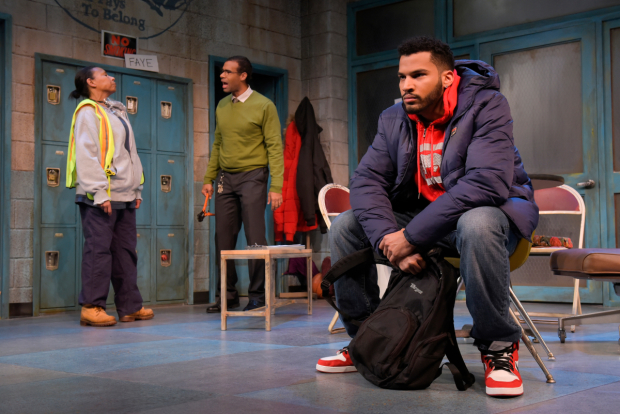Skeleton Crew

(© Kevin Berne)
The personal feels epic in Dominique Morisseau’s powerful Skeleton Crew, the third part of a stage trilogy examining Detroit in the jazzy '40s, the fiery '60s, and the bleak 2000s. A coproduction of Marin Theatre Company and TheatreWorks Silicon Valley, Skeleton Crew manages to be harrowing and hopeful, even as it effectively detonates the myth of the American dream.
Images of this American dream often involve a bright, shiny car, so what better place to give America a reality check than Motor City itself? Set in 2008, when the crash had already begun but the auto industry bailouts were still to come, Skeleton Crew confines its action to the break room for one of Detroit’s last small auto-stamping plants. Though we only meet three employees and a manager, it feels like we’re experiencing a huge slice of American life where the focus is on survival.
For the play’s two riveting hours, director Jade King Carroll brings out humor and heartache in almost equal measure and works in concert with Morisseau to push the drama as far as it can go without tipping into melodrama. When a story deals with life and death, rage and resignation, the threat of violence and the spark of young love, things could easily slip into soap opera territory. But that never happens here. Carroll, Morisseau, and a quartet of fine actors focus instead on reality and dignity.
Each of the play’s characters is a fully developed person. Faye, played by the remarkable Margo Hall, has spent 29 years on the shop floor. She has a wicked tongue and an enormous heart. She’s also the union rep and fights nobly for her coworkers. Faye has a deep connection with Reggie (Lance Gardner), the plant manager whose late mother was Faye’s best friend. When Reggie confides in Faye that the plant will shutter within the year, she’s torn between her union duties and her affection for and belief in Reggie.
There’s no good time for a plant closure, but the timing is especially poor for Dez (Christian Thompson), a volatile young man who is on the verge of getting off the assembly line and opening his own repair shop. It’s also bad for Shanita (Tristan Cunningham), a very pregnant single mother who is counting on her employee health benefits.
The tension surrounding the closure is compounded by a string of thefts at the plant and the covertly shared knowledge that someone is bringing a gun to work. Even without all the external conflict, Morisseau delves deep into her characters as they struggle with looking out for themselves and taking care of one another. That’s ultimately what is so moving about the show — people dealing with harsh reality and managing to find strength in their shared experience.
In addition to Hall’s extraordinary work as the multilayered Faye, the actors all shine here, whether it’s Thompson’s ability to find the heart in Dez’s anger, Cunningham mining every ounce of hope Shanita can muster against a rising panic, or Gardner's conflicted Reggie, who knows his job makes him "the man" but who passionately identifies with the plight of the workers.
Skeleton Crew is a profound workplace drama. There’s so much that makes it feel familiar, from the shabby realism of Ed Haynes’s set to the harshness of the fluorescent lighting in Steve Mannshardt’s design. But it’s the people, their struggle, and ultimately their compassion that makes this all-too-real drama feel more resilient than tragic.










